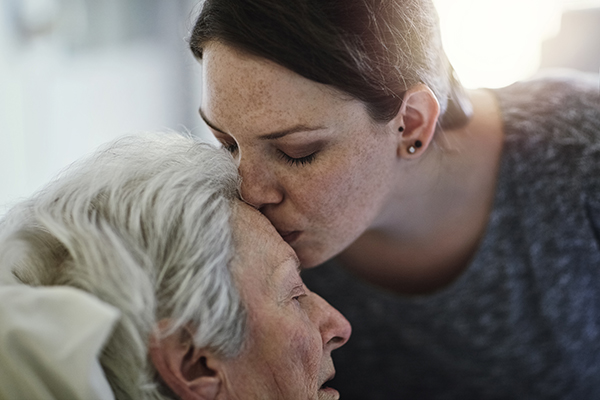
As summer temperatures and humidity soar, warm weather has the ability to increase the risk of dehydration. Not enough fluids can pose a serious health problem for anyone, but older adults are at particular risk.
Why Seniors Are at Risk
There are a few reasons why older adults are more susceptible to fluid and electrolyte imbalances. With age, our body’s ability to conserve water is reduced. This can make it more difficult to adapt to things like fluctuating temperatures. Additionally, the sense of thirst diminishes with age. By the time someone actually feels thirsty, essential fluids could already be extremely low.
Certain medical conditions and medications can affect a senior’s ability to retain fluids. Individuals with dementia may forget to eat and drink, and in more advanced stages may have difficulty swallowing. Drugs like diuretics, antihistamines, laxatives, antipsychotics and corticosteroids can cause frequent urination that depletes water and electrolytes. Furthermore, seniors who experience incontinence often purposely refuse or limit fluids in order to avoid accidents.
Signs and Symptoms of Dehydration
As a family caregiver, it’s important to be mindful of the signs and symptoms and to communicate with a doctor or health professional if you notice red flags that could indicate complications from fluid loss.
Picking up on the more subtle, early signs that a senior needs to up their fluid intake is crucial. Keep in mind that thirst is not usually a helpful indicator, because a person who feels thirsty may already be dehydrated. Initial signs to look for include headache, constipation, muscle cramps, dry mouth and tongue, and sleepiness or lethargy. Urine color is another helpful indicator and should be clear or light yellow for someone who is properly hydrated.
If severe dehydration goes unchecked, it can cause seizures due to electrolyte imbalance, a reduction in the volume of blood in the body (hypovolemic shock), kidney failure, heat injuries, and even coma or death.
Signs of Severe Dehydration
- Little or no urination
- Dark or amber-colored urine
- Dry skin that stays folded when pinched
- Irritability, dizziness, or confusion
- Low blood pressure
- Rapid breathing and heartbeat
- Weak pulse
- Cold hands and feet
Preventing Dehydration
For most of us, drinking plenty of fluids and eating foods with high water content is a great way to keep our bodies properly hydrated in warmer weather. Most adults need about 64 ounces of fluid every day, but that amount increases with heat and humidity and can change based on various medications and health conditions.
A good rule of thumb is to try balancing fluid intake with output. If a senior is sweating or urinating more frequently, then their fluid intake should become more frequent as well. If a loved one is suffering from an illness that causes fever, diarrhea or vomiting, carefully monitoring fluid intake is crucial. Keep in mind that you can become dehydrated in cold weather, too!
Ways to Increase Fluid Intake
Remember, water isn’t the only option. Most fluids count towards the 64 ounces (except for alcohol), and many foods do too.
If a senior refuses to drink plain water, there are plenty of modifications and alternatives available. Try using water enhancers, opting for pre-flavored waters, serving a half water half juice mixture, or fruit-infused water.
Consider both savory and sweet flavors. Warm chicken, beef or vegetable broth can provide a soothing savory source of fluids and electrolytes that seems more like a “meal” and less like a drink. For those who are fond of sweets, popsicles, milkshakes and smoothies may be more enticing options that function as a sweet vehicle for fluids.
How you serve beverages can have an effect on a loved one’s willingness and ability to drink them. Experimenting with different serving temperatures may make beverages more appealing. Individual preferences vary regarding the palatability of different temperatures. Serving a drink at the desired temperature will increase the likelihood it will be consumed.
Drinkware can be an important component as well. Someone with low vision might be able to see an opaque, brightly colored cup more easily and therefore drink from it more often. Particularly resistant seniors may find a beverage more appetizing if it is served in a pretty glass or with garnish. For example, try serving a healthy smoothie in an old-fashioned soda fountain glass with a piece of fresh fruit on the rim.
Sometimes specialized drinkware may be necessary for those with swallowing difficulties, tremors, arthritis, motor skill problems and muscular weakness. Cups with two handles, a no-spill lid, a built-in straw, or ergonomic features may simplify the process and prevent spills.
Foods Can Be Hydrating, Too
While water is the go-to for most people, keep in mind that beverages are not the only source of fluids. Raw fruits and vegetables can pack a hydrating punch as well. For example, a small plate of cut vegetables, like celery sticks, cucumber slices, cherry tomatoes and bell pepper slices served with a healthy dressing or hummus for dipping can be a nutrition- and fluid-filled snack. Use the list below to add foods to your loved one's diet that will help keep them hydrated.
Foods with High Water Content
Ingredient | Percent Water | Serving Size |
Cucumber | 96% | 1 cup peeled and sliced |
Tomato | 94% | 1 medium |
Watermelon | 92% | 1 cup diced, or 10 balls |
Bell pepper | 92% | 3/4 cup sliced |
Grapes | 92% | 1 cup |
Cantaloupe | 90% | 1/10 (1 small wedge) |
Orange | 97% | 1 medium |
Blueberries | 85% | 1 cup |
Apple | 84% | 1 medium |
If a senior has an aversion to fruits and vegetables, especially when they are uncooked, high water content foods like crudités, salads or gazpacho may be an unrealistic approach. Instead, adding healthy ingredients into foods they already enjoy can yield small victories for a caregiver. Try adding a cup of fresh berries to a loved one’s yogurt, cereal or dessert, or add slices of tomato and a few leaves of lettuce to wraps and sandwiches. These may not seem like meaningful additions, but every little bit adds up. Incorporating these items on a daily basis can help your loved one prevent dehydration without significantly changing the amount of liquid they drink.
While these helpful guidelines make good health-sense, it is important to stay in communication with your loved one’s doctor and keep in mind that managing some medical conditions, such as heart failure and kidney or liver disease, may require intentional restrictions of fluid intake.
Expert - Jennifer Leeflang Aging Care https://www.agingcare.com/articles/hydration-tips-for-seniors-205594.htm















